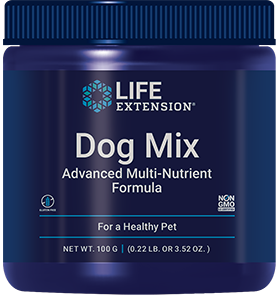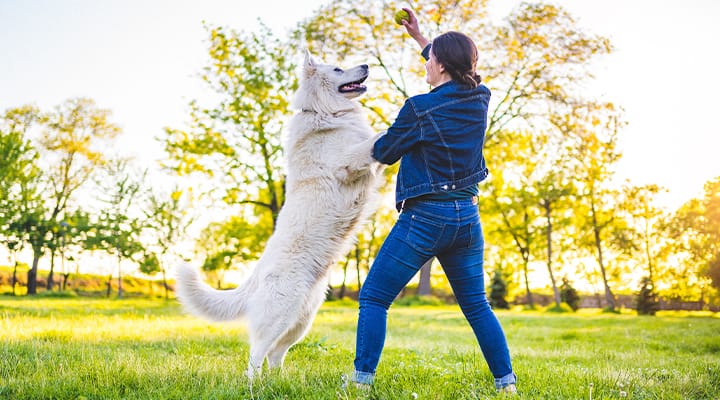
How to Keep Your Dog Healthy: 8 Pawesome Tips
Published: February 2024
We all want to live life as the healthiest versions of ourselves—and as pet owners, we want the same for our furry friends. Of course, you can't expect a detailed answer when you ask your dog, "Are you feeling amazing today?" (although tail-wagging seems to be an answer in the affirmative), and this makes it harder to nip any potential issues in the bud.
Not to worry: we speak "dog" and are happy to offer you a checklist for assessing your pet's present state of health, plus tips for helping to maintain optimal wellness from head to tail.
After all, we want to make those dog years last as long as possible!
8 tips to keep your dog healthy
Pet parents, raising a healthy dog doesn't have to be difficult. Here are 8 wellness tips to help your best friend enjoy mischief, adventures and everything in between.
1. Feed them balanced, nutrient-rich meals
As the popular saying goes, "You are what you eat," and your pooch is no exception. Naturally, a healthy diet is key for staying in tip-top shape. Making sure your dog's nutritional needs are met is easier than ever! You can go the traditional route with store-bought wet or dry dog food in cans or bags. If you're a pet owner who wants to serve your four-legged friend homemade meals, that's an option as well. But work with your veterinarian first to ensure their meals are well-balanced.
As long as you're giving your pet a balanced, nutrient-rich diet in the right amounts, that's what counts! Your vet can also guide you in choosing a multivitamin that's right for your pooch.
What’s Best for My Dog: Wet or Dry Food?
You can try both, but ultimately it will be up to your pup which they prefer. Smaller breeds and picky eaters tend to like wet food. Just know that wet food can be a little messier and go bad more quickly, especially when left in the heat. On the flip side, dry food is convenient, doesn't spoil as easily, and is generally more affordable. Plus, the hard, crunchy texture is great for dogs' teeth.
Pro tip: A high-quality multivitamin is a proactive way to bridge any nutritional gaps in their meal, especially if it's homemade.
2. Exercise with your pet
For your dog to stay healthy, it's fundamental you keep them moving—which is good news because you need to keep moving, too! Regular exercise encourages healthy aging, helps maintain strong bones, and makes it easier for you both to manage a healthy weight. As a dog owner, think of your dog's fitness as you would your own. Daily walks, trips to the dog park and high-energy, off-leash play sessions are all fantastic and fun ways to ensure your dog gets a good workout and happy hormones.
3. Keep an eye on the scale
You want to make sure your dog stays at a healthy weight. What that weight should be, however, can be a bit of a puzzle since every dog breed is unique. If you don't know what healthy weight is right for your dog, you can navigate the web to get an idea and follow up with your vet to confirm. Portion control is key. Follow the guidelines on the label on commercial food products, and you can always check with your vet for the right portion for your pooch, so you don't overfeed (or underfeed) them.
4. Be diligent about dental care
At your last dentist visit, did they tell you to brush and floss regularly? The same rings true for your pet (not the flossing part, but the brushing, for sure)! While it might not be possible for you to brush your dog's teeth every day, starting (and keeping) a daily dental hygiene routine is a good goal. If you get too busy, you can always use dental wipes, treats or chews to help remove any plaque or tartar between brushings. Your vet might recommend a yearly professional deep cleaning as well, especially as your senior pup ages.
5. Schedule regular check-ups with your dog’s vet
Getting an annual physical on the books is essential for us humans. And regular medical check-ups benefit your dog, too! Whether they are a six-week or six-year-old puppy, trips to the vet will keep your pet up to date on bloodwork, vaccines and dental care. Many providers have great insurance options, which offer built-in reminders (emails, text messages and phone calls) to make it easy for you to stay on top of routine appointments and maintain your dog's overall health.
6. Keep ticks and fleas at bay
You may be tempted to skip over this tip if you don't have other dogs around or live in an area with little vegetation. But it's always better to play it safe to help keep your dog healthy, even if you think the area you live in is low risk for ticks and fleas. Luckily, there are tons of preventative options available that are both effective and easy to use. Check with your vet for recommendations.
7. Make sure your dog stays hydrated
For a happy, hydrated pup, always provide clean, fresh water with multiple "watering holes" throughout your home and yard. Have a furry friend who is not a big fan of drinking from a bowl? Try an interactive toy or frozen treats—like a cucumber—to keep them refreshed and entertained. Going for a long walk or stopping at the dog park on a sunny day? Be sure to grab portable water bottles (for both of you)!
8. Spay or neuter your dog
Though this tip is last on our healthy list, it is one of the first ways you can keep your pet fit and strong. There are so many perks to having your dog spayed or neutered, ranging from a healthy lifespan to more manageable behavior. Consult with your vet for guidance.
Checklist: How do you know if your dog is healthy?
Following these tips is half the battle. It's just as important, though, to be on the lookout for any changes to your dog's health routine and to respond promptly if you're concerned. But with so many dog breeds and the various, normal life stages, it can be hard to know when you should call the vet or if your dog is just being a dog!
Stick with this checklist to track your dog's health.
Appetite and weight:
A fit pup will gain weight until adulthood and stay at or around the same weight their whole life. They'll have a healthy appetite and eat consistently. Speak with your veterinarian if you notice any changes in their eating patterns or weight, especially if they gain or lose a significant amount of weight.
What foods improve dogs’ health?
The following ingredients may help support your dog's health and well-being. For best results, stick with quality dog food that includes the following macros and nutrients:
- Protein: beef, pork, lamb, venison, chicken, salmon
- Carbs and fiber: carrots, peas, lentils, spinach, sweet potato
- Healthy fats: fish oil, peanut butter
- Probiotics: unsweetened, plain yogurt or kefir only—a high-quality dietary supplement can be an excellent alternative!
Teeth and gums:
Smooth, clean teeth and firm, pink, black or spotted gums (the same color as your dog's skin) are all signs of great dental health! Don't worry if you notice your dog's teeth are darker than they used to be: it's normal with age. A smelly breath can be normal, too, but check with your vet if it's not just bad but downright foul! You can help your pooch maintain dental health by brushing their teeth with a medium-soft toothbrush and dog-safe toothpaste.Eyes, nose, and ears:
Healthy eyes will be clear (and full of unconditional love for you). Their nose should be moist and clean, and their ears light pink and clean. If you notice anything out of the ordinary with your dog's eyes or ears or if their nose is not moist, consult your vet as soon as possible.Heartbeat and pulse:
Every dog breed is unique, and normal heart rate ranges vary accordingly. In a resting, adult dog, a normal heart beats between 50 to 130 times a minute, but again this will be faster in puppies and small dog breeds, and slower for healthy larger breeds. You can check your dog's heartbeat by placing your fingers over the left side of their chest or by gently pressing on the inside of the top of their hind leg.Body temperature:
A healthy dog's temperature will range from 101 to 102.5 degrees Fahrenheit or 38.9 to 39.2 degrees Celsius (slightly higher than a healthy human). The most accurate way to take their temperature is with a rectal dog thermometer (yes, not the most pleasant). You can always check with your vet if you feel your pup is running warmer than usual.Paws, hips and joints:
For dogs (and for us), joint comfort is key to regular movement. Make sure your pup is moving comfortably, has a full range of motion and seems to enjoy playing. Pro tip: A high-quality dietary supplement can be a proactive way to support your dog's hips and joints.Fur and skin:
If your dog's coat shines like a shampoo model and their skin is silky-smooth, you've got a healthy pooch on your hands! Pro tip: Help your dog maintain their glossy coat and healthy skin with fish oil for dogs.Bowel and urinary movements:
What is the consistency, regularity and appearance of your dog's pee and poo? You know your dog best, so always be on the lookout for any changes in color, consistency and even smell (yes, poop smells, well, like poop, but anything out of the ordinary is worth looking into)!Overall character:
A healthy dog is a dog whose unique personality always shines through! Whether they are an active tornado or a couch potato, always keep an eye out for any changes in your cuddle muffin's demeanor. And for those not-so-brave moments—whether it's deliveries, fireworks or being alone time at home—a high-quality calming chew may help your pooch keep an even keel and be the guard dog they are at heart.
Should I give my dog supplements?
Adding supplements to your dog's diet can be a great way to power up their daily dog food menu. The amount and type of supplements your pet may need will depend on a few factors, including age, weight, breed and any existing health conditions your furry friend may have. Be sure to consult with your veterinarian first before adding any supplements to their daily routine.
About the Author: Brooke L. Diaz has written for some of the world’s most notable brands—including Aveda, Macy’s, Gap and Chopra Global. She is certified in youth coaching and meditation and teaches strength, movement, and mindfulness to elementary-age children with her small business, Camp Vitamin C™. She’s also a dedicated mother of two.
Website: www.CampVitaminC.com
References
- "How to Keep Your Dog Healthy." American Kennel Club. November 2023. https://www.akc.org/expert-advice/health/how-to-keep-your-dog-healthy/
- "Nutrient Requirements of Dogs and Cats." National Research Council of the National Academies. 2006. https://nap.nationalacademies.org/catalog/10668/nutrient-requirements-of-dogs-and-cats
- "Spaying and Neutering." American Veterinary Medical Association. https://www.avma.org/resources-tools/pet-owners/petcare/spaying-and-neutering
Like what you read?
Please subscribe to get email updates on this blog.












